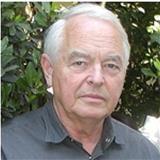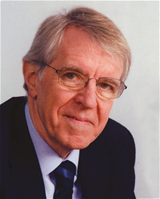Plenary Speakers
The EURO 2015 Committee are delighted to annouce the following Plenary Speakers for this years conference:
R. Tyrrell Rockafellar
University of Washington

Risk and Reliability in Stochastic Optimization
Problems of optimization are concerned with making decisions "optimally" however in many situations in management, finance and engineering, decisions have to be made without knowing fully how they will play out in the future. When the future is modeled probabilistically, this leads to stochastic optimization, yet the formulation of objectives and constraints can be far from obvious. A future cost or hazard variable may be a random variable which a present decision can influence to some extent, but maybe only in shaping its distribution in a limited way. For instance, it may
be desirable to keep a hazard below a particular threshold, like building a bridge to resist earthquakes and floods, and yet it may be impossible or too expensive to guarantee that the threshold will never be breached.
One needs to have a standard according to which a cost or hazard is "adequately" below the desired threshold in line with its probability distribution. That is the role for so-called "measures of risk," which started to be developed for purposes like assessing the solvency of banks but now are being utilized much more widely. Measures of risk also offer fresh ways of dealing with reliability constraints, such as have traditionally been imposed in engineering in terms of bounds on the probability of failure of various manufactured components. Probability of failure has troubling mathematical behaviour in an optimization environment. Now, though, there is a substitute, called buffered probability of failure, which makes better sense and is much easier to work with computationally.
Biography
R. Tyrrell Rockafellar completed his undergraduate work at Harvard in 1957, and his graduate work in 1963 at Harvard as well, after a two-year interruption with travel. His research interests span convex and variational analysis, with emphasis on applications to stochastic programming, optimal control, economics, Finance, and engineering.
Professor M. Grazia Speranza
Professor in Operations Research
University of Brescia

Trends in Transportation and Logistics
Operational research has, in the second part of the last century, given a massive contribution to the modeling and solution of complex problems in transportation and logistics, with the consequent implementation of sophisticated methods and development of software that has had a huge impact on the competitiveness of a number of companies. In this talk the major contributions of our discipline will be overviewed.
Technological changes have been dramatic in the last couple of decades. Information and communications technologies (ICT) nowadays enable users to access, store, transmit, and manipulate information. The limitations in data availability and communication possibilities our discipline has experienced in the past have been overcome. At the same time, the ICT, combined the globalization phenomena, have created new opportunities and expectations in companies, institutions and citizens. Opportunities and expectations are often accompanied by new risks. Environments are dynamic and uncertain. At the same time coordination possibilities are enormous. Advanced analytical methods and a systemic approach to problems are even more vital than in the past. Our discipline is faced with new challenges and new opportunities. In this talk some of the most promising research directions in the field of transportation and logistics will be discussed.
Biography
M. Grazia Speranza received a degree in mathematics and a Ph.D. degree in applied mathematics in 1980 and 1983, respectively, from the University of Milan. Since 1994, she has been a Full Professor of operations research at the University of Brescia. She was the President of the Research Council (1998–2000) and Vice-President of the University of Brescia (2000–2002), and the Dean of the Faculty of Economics and Business (2002–2008). She was President of EURO (Association of European Operational Research Societies) in 2011-12 and of TSL (Transportation Science & Logistics Society of INFORMS) in 2014. Her main scientific interests are optimization models and algorithms for transportation and logistics. Other scientific interests include scheduling, combinatorial optimization, and optimization models in finance. She has published more than 150 papers on these topics in international journals and volumes. She has also edited international volumes and special issues of journals. She serves as Associate Editor of Transportation Science, EURO Journal on Transportation and Logistics, 4OR, ITOR, TOP. She has organized international conferences, such as the first workshop on "Models and algorithms for planning and scheduling problems (MAPSP)" in Como (Italy) in 1993, "Odysseus" in Palermo (Italy) in 2003, "TRISTAN IV" in the Azores Islands (Portugal) in 2004, the "International Workshop on Distribution Logistics" in Brescia in 1998 and 2007. She has been a Member of the Scientific Committee and an Invited Speaker at several international conferences.
Professor Sir Alan Wilson
Professor of Urban Regional Systems
Centre for Advanced Spatial Analysis
Faculty of the Built Environment
University College London

Solving complex problems for the long term: cities in 2065
The objective of this talk is to explore the challenges of complexity science within OR, illustrated by the current Foresight project on the ‘Future of Cities in 2065’. Cities are archetypal nonlinear complex systems with the characteristic features of path dependence and the possibility of significant phase changes. The study of such systems for the long term involves OR handling challenges of interdependence and the development of large-scale models that can cope with high dimensionality. The models should be fully dynamic to allow for the explorations of future phase spaces. The approach of the Foresight project will be described: building evidence, recognising that long-term forecasting is impossible, but exploring future scenarios using an extended OR toolkit. The state of the science of urban modelling is reviewed, particularly given the aim of informing policy in the near future that will have long-term impacts.
Biography
Sir Alan Wilson FBA FAcSS FRS is Professor of Urban and Regional Systems in the Centre for Advanced Spatial Analysis at University College London. He is Chair of the Home Office Science Advisory Council and of the Lead Expert Group for the GO-Science Foresight Project on the Future of Cities. He was responsible for the introduction of a number of model building techniques which are now in common use internationally – such as the use of ‘entropy’ in building spatial interaction models – summarised in Entropy in urban and regional modelling. He rigorously deployed accounts’ concepts in demography and economic modelling and is now working with dynamical systems theory to model the evolution of urban structure. His current research, supported by ESRC and EPSRC grants, is on the evolution of cities and the dynamics of global trade, migration, security and development aid. He was Vice-Chancellor of the University of Leeds from 1991 to 2004 when he became Director-General for Higher Education in the then DfES. From 2007-2013 he was Chair of the Arts and Humanities Research Council. He is a Member of Academia Europaea, and a Fellow of the British Academy, the Academy of Social Sciences and of the Royal Society. He was knighted in 2001. His recent books include Knowledge power, published in 2010, The science of cities and regions and his five volume (edited) Urban modelling, both in 2013. Explorations in urban and regional dynamics: a case study in complexity science (with Joel Dearden) will be published by Routledge in 2015.